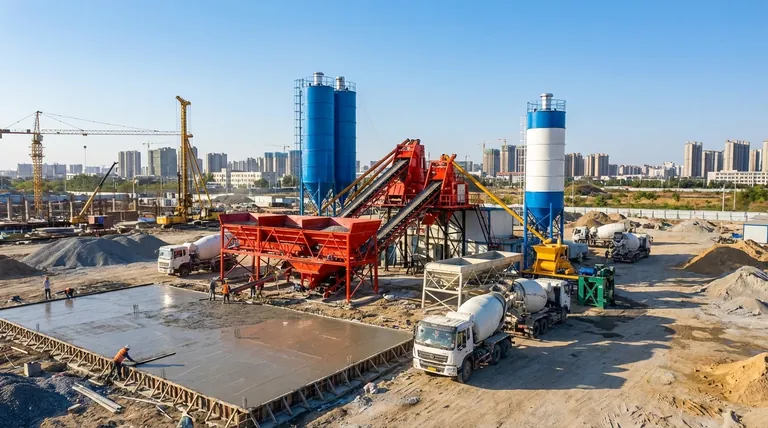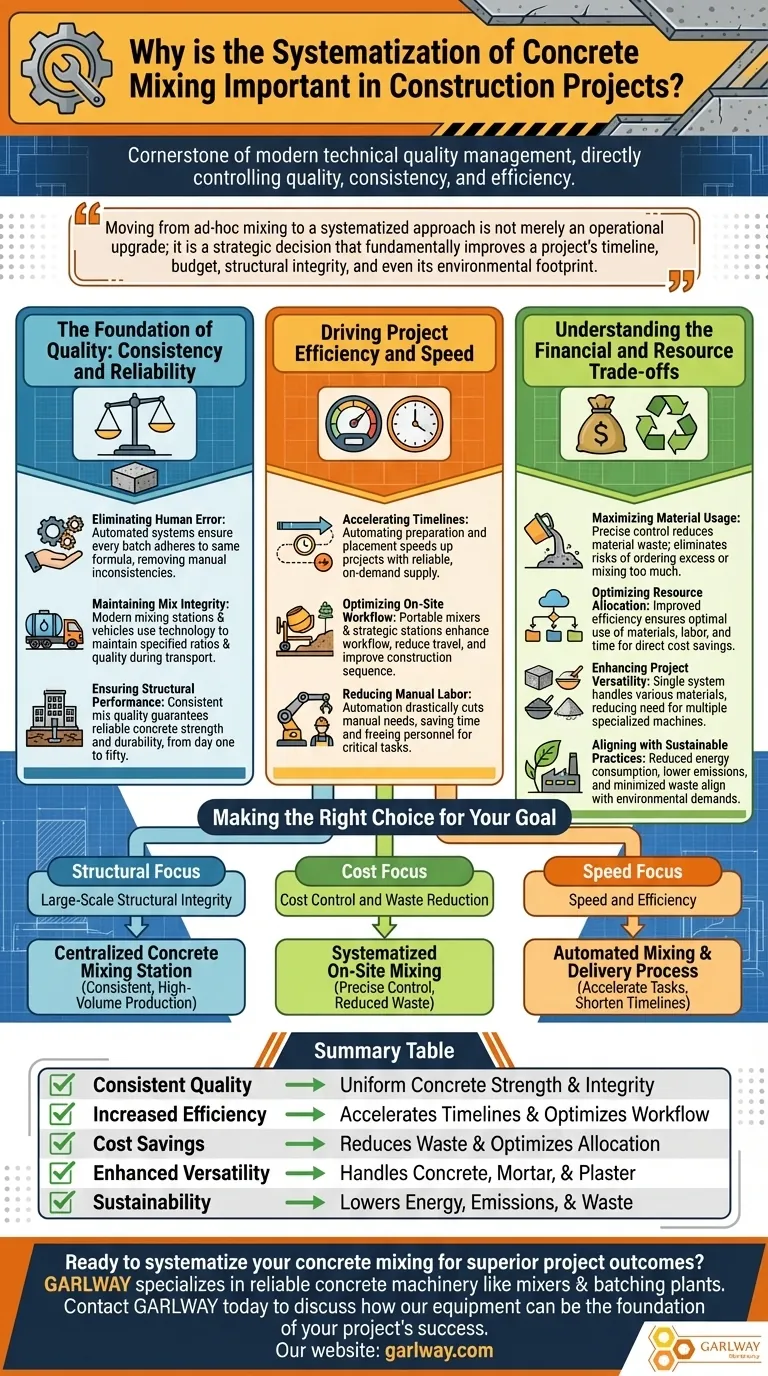In short, systematizing concrete mixing is critical because it directly controls the quality, consistency, and efficiency of a construction project. This shift from manual labor to a managed process is a cornerstone of modern technical quality management, ensuring that the concrete produced meets precise engineering standards every time.
Moving from ad-hoc mixing to a systematized approach is not merely an operational upgrade; it is a strategic decision that fundamentally improves a project's timeline, budget, structural integrity, and even its environmental footprint.

The Foundation of Quality: Consistency and Reliability
The primary reason to systematize concrete mixing is to remove variability. The structural integrity of a building or piece of infrastructure depends entirely on the predictable strength of its concrete, and predictability is impossible without a controlled process.
Eliminating Human Error
Automated systems for loading, mixing, and discharging materials ensure that every batch of concrete adheres to the same formula. This removes the inconsistencies and potential for error inherent in manual mixing.
Maintaining Mix Integrity
Modern mixing stations and transport vehicles use features like automatic transmission and dedicated water tanks. These technologies maintain the specified water-to-cement ratio and overall mix quality from the plant to the pour site.
Ensuring Structural Performance
Consistent mix quality translates directly to reliable concrete strength and durability. Systematization is the only way to guarantee that the material poured on day one has the exact same properties as the material poured on day fifty.
Driving Project Efficiency and Speed
Beyond quality, systematization fundamentally changes the speed and flow of a construction project. It transforms a potential bottleneck into a streamlined, predictable part of the workflow.
Accelerating Timelines
By automating and speeding up the concrete preparation and placement process, projects can be completed faster. A reliable, on-demand supply of quality concrete keeps the entire project moving forward without delays.
Optimizing On-Site Workflow
Portable mixers and strategically placed mixing stations allow for flexible placement on the job site. This enhances workflow, reduces travel time for materials, and allows for a more efficient construction sequence.
Reducing Manual Labor
Automation drastically reduces the need for manual labor in the mixing process. This not only saves time but also frees up valuable personnel to focus on other critical tasks, increasing overall site productivity.
Understanding the Financial and Resource Trade-offs
Systematization provides a clear and compelling financial case by turning waste and inefficiency into direct cost savings. While there is an upfront consideration for equipment, the long-term returns are significant.
Maximizing Material Usage
Precise control over the amount of concrete needed for each pour drastically reduces material waste. Systematized on-site mixing eliminates the risk of ordering excess from an off-site plant or mixing too much manually.
Optimizing Resource Allocation
By improving efficiency, systematization ensures that all resources—materials, labor, and time—are used optimally. This efficiency in concrete production is a key driver of overall project cost savings.
Enhancing Project Versatility
A single, capable mixing system can often handle various materials, including concrete, mortar, and plaster. This adaptability makes it a valuable asset across different phases of a project, reducing the need for multiple specialized machines.
Aligning with Sustainable Practices
Modern concrete mixing plants are designed with sustainability in mind. Their reduced energy consumption, lower emissions, and minimized waste generation align directly with the growing demand for environmentally responsible construction practices.
Making the Right Choice for Your Goal
Selecting the right approach to concrete mixing is essential for a project's success. Your decision should be based on your primary objectives.
- If your primary focus is large-scale structural integrity: A centralized concrete mixing station is the only way to guarantee the consistent, high-volume production required.
- If your primary focus is cost control and waste reduction: Systematized on-site mixing gives you precise control over materials, directly cutting down on waste and unnecessary expenses.
- If your primary focus is speed and efficiency: Automating the mixing and delivery process is the most effective way to accelerate concrete-related tasks and shorten overall project timelines.
Ultimately, systematizing concrete mixing elevates a variable craft into a predictable, reliable, and optimized industrial process.
Summary Table:
| Key Benefit | Impact on Construction Project |
|---|---|
| Consistent Quality | Guarantees uniform concrete strength and structural integrity. |
| Increased Efficiency | Accelerates timelines and optimizes on-site workflow. |
| Cost Savings | Reduces material waste and optimizes resource allocation. |
| Enhanced Versatility | A single system can handle concrete, mortar, and plaster. |
| Sustainability | Lowers energy consumption, emissions, and waste generation. |
Ready to systematize your concrete mixing for superior project outcomes?
GARLWAY specializes in providing construction companies and contractors globally with reliable machinery like concrete mixers and batching plants. Our solutions are engineered to deliver the consistency, efficiency, and cost savings your projects demand.
Contact GARLWAY today to discuss how our equipment can be the foundation of your project's success.
Visual Guide

Related Products
- HZS35 Small Cement Concrete Mixing Batch Plant
- Construction Products Concrete Plant Machine Mixing Concrete Mixer
- Portable Concrete Mixer Machine Equipment for Mixing Concrete
- HZS180 Ready Mix Concrete Plant for Foundations with Sand and Cement
- HZS75 Concrete Batching Plant Cement Mixer Price Concrete Mixer Bunnings Mixing Plant
People Also Ask
- How does a small cement mixer improve time efficiency? Automate Mixing & Boost Productivity
- How are the roads within a concrete mixing station typically designed? Optimize for Safety and Efficiency
- What are the factors to be considered when designing a concrete mixture? Master the Balance for Strength & Workability
- How can the discharging stage be optimized to improve overall concrete mixing efficiency? Fix the Mixer-to-Vehicle Handoff Bottleneck
- What are the factors influencing choice of a concrete mixing plant? Key Considerations for Efficiency



















